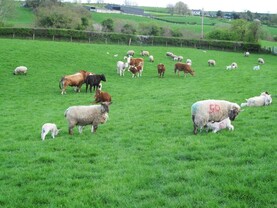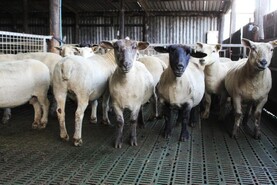Jorge is the latest in a series of storms that have hit Ireland so far this year. As well as high winds, these storms have brought unprecedented levels of rainfall. So much so that for many parts of the country the land is saturated with water and this will delay turnout.
This is causing problems in the management of livestock, which may affect animal health and productivity.
1. Humidity in sheds
Due to the high rainfall, the relative humidity in sheds is increased as the rain is blown into sheds by the high winds. This moisture in the air is a comfortable environment for most pathogens.
2. Wet floors/beds
Strong gusts are blowing rain through space sheeting on grooves and space boards on the exposed sides of livestock sheds. This means that there may be high levels of moisture on floors and lying beds and this may lead to environmental mastitis, which is particularly relevant to dairy cows (both dry and lactating).
This may also apply to calf sheds if rain is blown on to calf bedding areas. It can prove very difficult to keep straw beds in particular dry in such conditions.
Wet straw beds are to be avoided particularly for young calves in particular as the navel may not have completely dried out and it could facilitate the entry of pathogens, leading to navel and joint infections.
A wet bed will lead to a wet calf and wet calves have a reduced core body temperature, which increases susceptibility to pneumonia and scours in particular.
3. Overcrowding
The delay in turnout means that animals are being kept in houses when they would otherwise be out at grass. This means that there are more animals in houses than there might otherwise be. Animals are more likely to become sick in overcrowded sheds.
4. Nutrition
A delay in turnout for dairy cows could cause nutritional problems down the line. In the first instance, it will mean there will be greater demand for silage and could lead to shortages if the weather doesn’t pick up in time.
Additionally, spring grass is rich in energy and a delay in moving onto this forage, without concentrate supplementation, could augment the early lactation negative energy balance which may have an impact on fertility when the breeding season starts.
5. Parasitism
The high rainfall is producing ground conditions which facilitate both liver and rumen fluke infestations. This will be particularly relevant to out-wintered sheep and cattle. It remains to be seen whether there will be increased levels of these parasites in livestock in the coming months, if ground conditions remain wet or flooded for prolonged periods.
Read more
Is IBR vaccination worth considering this winter?
'My cattle are scratching already' – dealing with mites and lice
Jorge is the latest in a series of storms that have hit Ireland so far this year. As well as high winds, these storms have brought unprecedented levels of rainfall. So much so that for many parts of the country the land is saturated with water and this will delay turnout.
This is causing problems in the management of livestock, which may affect animal health and productivity.
1. Humidity in sheds
Due to the high rainfall, the relative humidity in sheds is increased as the rain is blown into sheds by the high winds. This moisture in the air is a comfortable environment for most pathogens.
2. Wet floors/beds
Strong gusts are blowing rain through space sheeting on grooves and space boards on the exposed sides of livestock sheds. This means that there may be high levels of moisture on floors and lying beds and this may lead to environmental mastitis, which is particularly relevant to dairy cows (both dry and lactating).
This may also apply to calf sheds if rain is blown on to calf bedding areas. It can prove very difficult to keep straw beds in particular dry in such conditions.
Wet straw beds are to be avoided particularly for young calves in particular as the navel may not have completely dried out and it could facilitate the entry of pathogens, leading to navel and joint infections.
A wet bed will lead to a wet calf and wet calves have a reduced core body temperature, which increases susceptibility to pneumonia and scours in particular.
3. Overcrowding
The delay in turnout means that animals are being kept in houses when they would otherwise be out at grass. This means that there are more animals in houses than there might otherwise be. Animals are more likely to become sick in overcrowded sheds.
4. Nutrition
A delay in turnout for dairy cows could cause nutritional problems down the line. In the first instance, it will mean there will be greater demand for silage and could lead to shortages if the weather doesn’t pick up in time.
Additionally, spring grass is rich in energy and a delay in moving onto this forage, without concentrate supplementation, could augment the early lactation negative energy balance which may have an impact on fertility when the breeding season starts.
5. Parasitism
The high rainfall is producing ground conditions which facilitate both liver and rumen fluke infestations. This will be particularly relevant to out-wintered sheep and cattle. It remains to be seen whether there will be increased levels of these parasites in livestock in the coming months, if ground conditions remain wet or flooded for prolonged periods.
Read more
Is IBR vaccination worth considering this winter?
'My cattle are scratching already' – dealing with mites and lice






 This is a subscriber-only article
This is a subscriber-only article








SHARING OPTIONS: